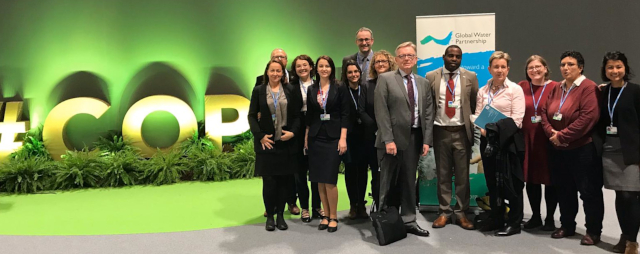Building resilience to the adverse effects of climate change on water requires a comprehensive approach and a long-term outlook.The Water Resilience Frontiers Initiative is part of an interagency effort, coordinated by the UNFCCC's Nairobi Work Programme, called the Resilience Frontiers Initiative, which deals with questions on how to maximize our resilience to climate change beyond 2030. This is done by addressing opportunities and challenges in harnessing the potential of disruptive frontier technologies and emerging social trends towards sustainability.
"As Global Water Partnership, if we have learnt anything from our work spanning more than 20 years, is that you can't apply stationary thinking when it comes to solving water issues of today. You have to think long term. Water investments, water planning, water legislation, and policies take a long time, so you need a long-term perspective. And in 2030, it is going to be a very different world," said Alex Simalabwi, Global Head of the GWP climate team. He pointed out that when planning for the future, you need to bear in mind, for instance, that new technology will have developed that may solve issues that aren't possible today.
"2030 is over ten years away, and it takes longer than that to do proper planning and get investments in place for water management. We must apply a very different way of thinking, and this is where Resilience Frontiers becomes a useful framework for GWP to reimagine the future and forget about today's thinking. It is useful to reflect on the mistakes we have made and learn lessons from there, but we need to have a completely new way of thinking for 2030 and beyond," says Simalabwi.
GWP Executive Secretary Monika Weber-Fahr introduced the new initiative in her high-level statement to the final plenary session of COP25 and she promised: “Together with our partners, we will identify ideas and concrete actions that can contribute to climate resilience through water – well beyond 2030.”
New publications
In addition to the Water Resilience Frontiers Initiative, GWP launched new publications at COP25. The Untold Story of Water in Climate Adaptation – Part II: 15 Countries Speak was done in collaboration with the Overseas Development Institute (ODI). It is based on an in-depth analysis of 15 countries, examining whether and how their Nationally Determined Contributions (NDCs) and National Adaptation Plans (NAPs) build climate resilience through work on water issues. The research also looks at the countries’ Sustainable Development Goals (SDGs) strategies to see how they depend on and harness the availability – in quantity and timing – and the quality of water. This publication was launched at an event in the NDC Partnership Pavilion on 7 December.
Monika Weber-Fahr said that in the new analysis, few countries demonstrate understanding of how integrated approaches to water resources management can support sustainable development in the face of climate change. She summed up some of the key findings: "It's messy - nowhere is there real integration, even where countries self-rate "high" on water governance - though everyone is trying. Transboundary management is also dramatically absent. Leadership is what can break this circle, we've seen this in for instance Bangladesh, Chile and Grenada, and management tools serve to help integration. By and large, the final big conclusion is that water governance and management can be an entry point to bring the agendas together."
In addition to the GWP-ODI report, GWP recently published Mobilising Change Makers, which was officially launched at COP25 on 10 December, at the U.K. Pavilion. This publication tells the stories of people and institutions from 10 countries who keep our waters safe and who are instigating changes at all levels to improve climate resilience – paving the way to protect hundreds of thousands of people from climate change-induced damage and destruction.
The final publication that was introduced at the climate conference – while formally launched already in April 2019 – was Addressing Water in National Adaptation Plans – Water Supplement to the UNFCCC NAP Technical Guidelines. Acknowledging that well-planned climate-responsive water management strategies and actions provide significant opportunity to build resilience, the NAP Water Supplement offers guidance for integrating water perspectives in countries’ NAP processes.
The GWP delegation summarized its COP25 activities and findings in a press conference on 11 December, under the headline NDCs and SDGs: water as a connector to increase ambitions and accelerate implementation. A recording of the full press conference is available on demand:
Top photo: the full GWP delegation at the COP25 venue in Madrid.

